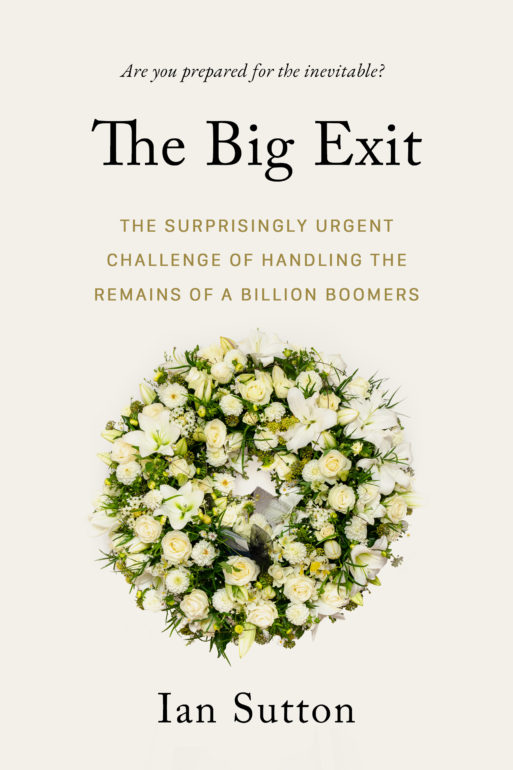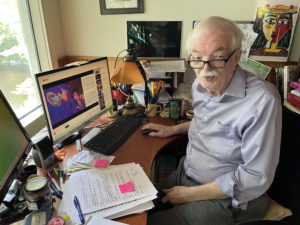
“The Big Exit” explores complex choices for disposing of your body when you die.
In “The Big Exit,” author Ian Sutton explains why we are so unprepared to bury the bodies of billions of boomers projected to die over the next several decades, while urging us to examine eco-friendlier alternatives. According to Sutton, we are running out of space to bury the dead. And the rising popularity of cremation comes at a cost as it negatively impacts the environment. But don’t fret. Sutton walks you through more than a few innovative disposition ideas to consider, including how or where to find the means to do so. You might ultimately decide to blast your ashes into space, compost yourself or donate your body to improve lives in the future.

“The Big Exit” author, Ian Sutton, shares additional insight from varied authors and death experts to further educate and encourage how we might better prepare for our inevitable death.
The book serves as Sutton’s plea: It is imperative that we think about employing better ideas now, not later. We are dying from the day we are born, much like a ripening banana, yet individually and collectively, we are reluctant to prepare for it. Although the book does relay some dire warnings, “The Big Exit: The surprisingly urgent challenge of handling the remains of a billion boomers” is not all doom and gloom. Sutton told the host of “Full Comment” podcast, “I didn’t want it to be particularly morbid, but it’s hard to avoid that.” However, Sutton believes the subject of death can also be entertaining in some fashion.
Death of the Cemetery
There is a shortage of cemeteries in the U.S. and globally, Sutton warns. Most are running out of room, and we have not built any substantial new ones in decades. Space is becoming so limited that some cemeteries now allow only the burial of ashes. A few have resorted to double decker gravesites, meaning that anybody currently buried can be dug out and buried deeper, so another body can be buried on top of it. And others are creating vertical cemeteries in an effort to save space.
Additionally, the burial premise we have set causes decomposition to happen at a slower rate, thanks to padded coffins and cement vaults. As if this were not enough to spur a need for change, Sutton explains how embalming fluid has been discovered in water supplies near many of our modern-day burial grounds. All the while, burial remains a common and costly means of disposition.
Eco-Friendly Alternatives

“The Big Exit” warns that cemeteries are already too full to bury billions of baby boomers, who are expected to die midcentury.
Since the process of cremation causes greenhouse gas emissions, Sutton makes it clear there is an urgency to consider other alternatives. Thankfully, an abundance of eco-friendly disposition avenues are available and on the rise. Aquamation, often referred to as water or chemical cremation, is quite environmentally sound. However, it is sparsely available and unaffordable for most. Green burials may be less toxic than standard practices, but are bound to certain places and may not be readily accessible to everyone.
Alternatively, Sutton notes, “Composting isn’t just for food waste.” The body can be placed in a vessel and covered with organic materials like wood chips or straw. Add a little bacterium, fungi, oxygen…and “voila!” The body is reduced to organic matter in a matter of months. But perhaps the most natural (although somewhat disturbing) disposition choice is something called “excarnation.” Sutton explains this is the act of leaving your body atop a mountain where wild animals and nature can break it down by the means in which they have done for centuries.
Regardless of what you choose, Sutton encourages you to vet the pros and cons before investing in any means of final disposition.
Are You Prepared for the Inevitable?

Space burial companies will deliver human remains to the moon while others launch them into space to decompose. It is believed the remains will decay while in orbit and return to Earth as a shooting star.
For the more adventurous souls who want to make “The Big Exit” (pun intended), why not wrap yourself inside a mushroom burial suit to quicken the decomposition process? Or how about sculpting your cremated ashes into cement anchors to create living reef memorials at the bottom of the ocean? But if sustaining human life is most important to you, you might donate your body to science. Researchers can study how the body decays to develop new decomposition technologies, or perhaps they might discover new ways to extend life itself.
However we want to be remembered when we die, disposition takes some planning. This is key for us, for our family and for the planet. We should not rely on funeral directors to live up to their marketing slogans to make your death wishes come true. Sutton implores us to plan it for ourselves. We can take control of our eventual departure without burdening loved ones with promises, decisions or associated costs.
No matter what we may ultimately choose for ourselves and our bodies, Sutton invites us to plant a tree. After 500 years, one single tree can wipe out the carbon footprint that one human life leaves upon this earth. Nature is the best weapon we have to counterbalance the collective effects humans continue to cause to the world, dead or alive.

 “The Big Exit” by Ian Sutton
“The Big Exit” by Ian Sutton


 Debating Medical Aid in Dying
Debating Medical Aid in Dying
 “Help Me, Helen”
“Help Me, Helen”















